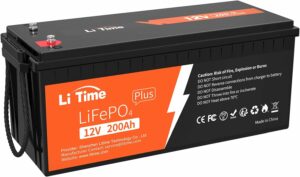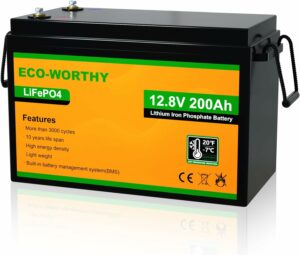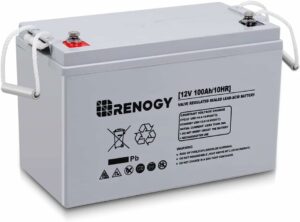Home Solar Battery Backup
Introduction
Home Solar Battery Backup is a system that integrates solar panels with energy storage solutions to harness and store solar energy for later use.
Unlike traditional solar power systems that feed excess energy back into the grid, a solar battery backup allows homeowners to store surplus energy produced during sunny days during low sunlight or power outages.
The primary purpose is to enhance energy independence, reduce reliance on the grid, and contribute to a more sustainable and resilient energy ecosystem.
Provo Green Products embodies a beacon of trust in sustainable discoveries, offering choices that enhance your life and leave a positive mark on our planet.
Leveraging extensive expertise in manufacturing, construction, and various trades, we provide a solid foundation for sustainable living.
Our meticulous research process guarantees that our information about each product is precise and current, allowing you to make informed decisions.
Whether your interest lies in solar products, electric bikes, or other eco-friendly alternatives, our commitment to credibility ensures you have access to dependable insights, guiding your journey toward a more sustainable lifestyle.
Provo Green Products is your go-to destination for finding the right green products for your lifestyle.
Disclosure: We may earn a small commission if you click on one of our links. This will not affect the pricing of the product whatsoever.
Components of a Home Solar Battery Backup System
Solar Panels: Generation of Solar Power
- Solar panels, or photovoltaic (PV) panels, are the fundamental components responsible for capturing sunlight and converting it into electrical energy. These panels are typically mounted on the roof or in an open area with maximum sun exposure. As sunlight strikes the semiconductor material within the panels, it generates direct current (DC) electricity flow.
Inverter Technology: Converting DC to AC
- The DC electricity generated by solar panels is not directly usable for most home appliances operating on alternating current (AC). This is where inverters come into play. Inverter technology is crucial in converting the DC electricity produced by the solar panels into the AC electricity required for household use. This ensures seamless compatibility with standard electrical appliances.
Energy Storage: Types of Batteries Used
- Energy storage is a pivotal aspect of a solar battery backup system. Various types of batteries are employed for this purpose, including lithium-ion, lead-acid, and flow batteries. Lithium-ion batteries are popular due to their high energy density, longer lifespan, and relatively lighter weight. The chosen battery type impacts the system’s overall performance, lifespan, and efficiency in storing and discharging energy.
Charge Controllers: Managing the Charging Process
- Charge controllers play a critical role in preventing overcharging or deep discharging of batteries, which can lead to reduced battery life. They regulate energy flow from the solar panels to the batteries, ensuring optimal charging conditions. Additionally, charge controllers protect the batteries from damage caused by extreme weather conditions or electrical fluctuations, enhancing the overall reliability of the solar battery backup system.
Understanding the components of a home solar battery backup system makes it evident that each element plays a specific role in the seamless generation, conversion, storage, and management of solar energy.
This integrated system allows homeowners to maximize the efficiency of their solar power setup and enjoy a consistent and reliable power supply.
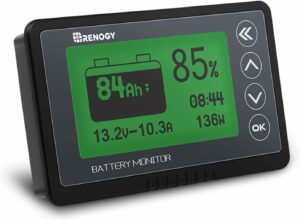
Benefits of Installing a Solar Battery Backup
Energy Independence and Resilience
- One of the primary benefits of installing a solar battery backup system is the increased energy independence it offers homeowners. By capturing and storing solar energy, households can reduce their reliance on the traditional power grid. This energy independence is particularly valuable during peak demand periods, electrical grid disruptions, or in regions prone to power outages. Solar battery backups provide a degree of energy resilience, ensuring a continuous power supply even when external factors affect the grid.
Cost Savings and Return on Investment
- Beyond the environmental benefits, a solar battery backup system can result in significant cost savings for homeowners. The stored solar energy can be utilized during peak demand periods, reducing the reliance on grid electricity when rates are typically higher. Additionally, in some regions, homeowners can participate in net metering programs, allowing them to sell excess energy back to the grid and earn credits or financial incentives. While the initial investment in a solar battery backup system may seem substantial, the long-term savings and return on investment make it a financially sound decision.
Environmental Impact and Sustainability
- The adoption of solar energy and battery storage contributes to a more sustainable and eco-friendly lifestyle. Solar power is a clean and renewable energy source that produces minimal greenhouse gas emissions compared to traditional fossil fuels. Homeowners actively participate in the global effort to combat climate change and promote environmental sustainability by reducing dependence on grid electricity from non-renewable sources.
Grid Independence During Power Outages
- A standout advantage of solar battery backups is their ability to provide a reliable power source during power outages. Traditional grid-dependent homes are vulnerable to disruptions caused by severe weather, accidents, or maintenance issues. In contrast, homes with solar battery backups can seamlessly switch to stored energy, ensuring that essential appliances and systems remain operational during outages. This enhances the comfort and safety of the occupants and adds an extra layer of security in emergencies.
In summary, the benefits of installing a solar battery backup system extend beyond cost savings to encompass energy independence, environmental responsibility, and enhanced resilience during power interruptions.
These advantages decide to invest in solar battery technology, a compelling choice for homeowners seeking a more sustainable and reliable energy solution.
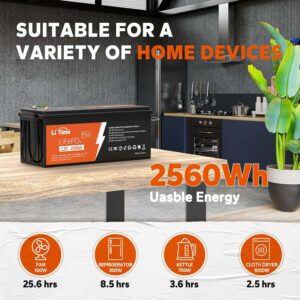
Installation and Maintenance Considerations
Site Assessment: Sunlight Exposure and Roof Angle
- A thorough site assessment is crucial before installing a home solar battery backup system. Sunlight exposure is paramount for optimal energy generation, so assess the orientation and tilt of your roof or the designated installation area. The angle of the solar panels should be adjusted to maximize sunlight absorption throughout the day. Consider potential shading from nearby structures or trees, as it can significantly impact the efficiency of the solar power system.
Choosing the Right Battery Capacity
- Selecting the appropriate battery capacity is a critical decision in the installation process. The battery capacity determines how much energy can be stored and used during low sunlight or power outages. Factors such as household energy consumption patterns, the desired level of backup power, and local weather conditions should be considered. Consulting with a professional installer can help determine the optimal battery capacity for your specific needs.
Professional Installation vs. DIY
- While some homeowners may be tempted to embark on a do-it-yourself (DIY) solar installation, enlisting a professional installer’s services is often recommended. Installing a solar battery backup system involves complex electrical work and ensuring compliance with local building codes. Professionals have the expertise to assess your property, design an efficient system, and safely handle installation. This ensures the system’s optimal performance and minimizes the risk of errors that could lead to inefficiencies or safety hazards.
Routine Maintenance and System Monitoring
- Ongoing maintenance is essential to keep your solar battery backup system operating at peak efficiency. Regularly cleaning the solar panels to remove dirt, debris, or snow ensures optimal sunlight absorption. Monitoring the system’s performance through built-in monitoring tools or external software allows homeowners to promptly identify and address any issues. Additionally, periodic inspections by qualified professionals can detect potential problems early, preventing costly repairs and maximizing the system’s lifespan.
Financial Incentives and Rebates
- Before proceeding with installation, research available financial incentives and rebates; many regions offer incentives to encourage the adoption of solar energy, such as tax credits, rebates, or grants. Understanding and taking advantage of these opportunities can significantly offset the initial installation costs, making the transition to solar energy more economically viable.
The installation and maintenance considerations for a home solar battery backup system involve carefully assessing the site, selecting components, and ongoing monitoring and maintenance efforts.
Homeowners can ensure a reliable and efficient solar power solution by approaching the installation process diligently and seeking professional guidance.
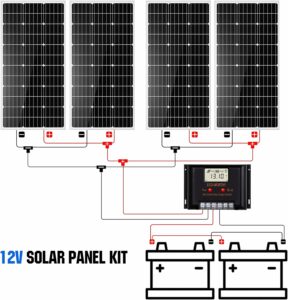
Case Studies and Success Stories
Example 1: Urban Residence Embraces Solar Independence
In a bustling urban setting, a forward-thinking homeowner embraced solar independence.
Facing rising electricity costs and occasional power outages, they opted for a solar battery backup system. The installation seamlessly integrated with their rooftop solar panels, allowing the home to generate and store energy efficiently.
This case highlights the adaptability of solar technology in urban environments, providing a sustainable and reliable energy source even in densely populated areas.
Example 2: Off-Grid Living in Rural Countryside
Venturing into the serene countryside, a family seeking off-grid living installed a comprehensive solar battery backup system.
With no access to the traditional power grid, the system became the lifeline for their energy needs.
Solar panels were strategically positioned to harness maximum sunlight, and a robust battery storage solution ensured a consistent power supply.
This case illustrates how solar technology enables sustainable living in remote locations, showcasing the potential for energy self-sufficiency.
Example 3: Energy Resilience in the Face of Natural Disasters
Homeowners increasingly turn to solar battery backup systems for energy resilience in regions prone to natural disasters, such as hurricanes or wildfires.
One such case involves a family who, after experiencing prolonged power outages during hurricane seasons, invested in a solar battery setup.
The system proved invaluable during extended power disruptions, providing a reliable energy source for essential appliances and ensuring the safety and comfort of the occupants.
Example 4: Small Business Goes Green with Solar
Beyond residential applications, small businesses are also reaping the benefits of solar technology.
A local business owner decided to go green by installing a solar battery backup system.
Not only did this reduce operational costs, but it also positioned the business as environmentally conscious, attracting eco-conscious customers.
This example demonstrates how solar solutions contribute to cost savings and a positive brand image for businesses.
Testimonials from Homeowners
Sarah’s Journey to Energy Independence
Sarah, a homeowner in a suburban neighborhood, shares her journey toward energy independence through a solar battery backup system.
Frustrated with fluctuating energy bills and concerned about the environmental impact of traditional energy sources, Sarah decided to invest in solar technology.
With a solar panel installation complemented by a battery backup system, Sarah now enjoys the peace of mind that comes with a reliable and sustainable energy source.
Her testimonial highlights the positive impact on her family’s budget, reduced carbon footprint, and the satisfaction of contributing to a cleaner environment.
Mark’s Resilience During Power Outages
Mark recounts his solar battery backup’s invaluable role during a recent storm in an area prone to severe weather and power outages.
With the grid offline for an extended period, Mark’s home remained powered, providing essential energy for lighting, refrigeration, and medical equipment.
Mark’s testimonial emphasizes the critical nature of a solar battery backup in ensuring energy resilience during unexpected events, underscoring the system’s role in maintaining normalcy and safety.
Maria’s Financial Gains and Environmental Stewardship
Maria, a homeowner keen on financial savings and environmental impact, shares her positive experience with a solar battery backup.
Beyond the immediate reduction in her electricity bills, Maria emphasizes the long-term financial gains achieved through net metering and government incentives.
Her testimonial speaks to the dual benefits of financial savings and environmental stewardship, demonstrating how solar technology aligns with personal and global sustainability goals.
Conclusion
The journey into the realm of home solar battery backup systems unveils a transformative landscape where energy independence, financial savings, and environmental stewardship converge.
Homeowners’ real-life examples and testimonials vividly show the tangible benefits experienced across diverse settings, from suburban homes to rural retreats and small businesses.
These stories underscore the reliability of solar technology during power outages and its capacity to reshape lifestyles and foster a deeper connection to sustainability.
Stay in Touch!
I’am a dedicated entrepreneur with many years of experience and an integrity-driven individual who is highly motivated to succeed. Leveraging extensive expertise in manufacturing, construction, and various trades, we can provide a solid foundation for sustainable living. Our meticulous research process guarantees that our information about each product is precise and current, allowing you to make informed decisions. A deep understanding of business operations empowers me to consistently implement improvements that result in ongoing success. Visit site.

